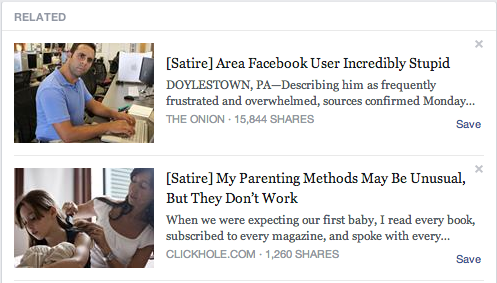Satire on Facebook now comes with a disclosure.
Click on an Onion article in a Facebook News Feed, and the related headlines from the same site that pop up beneath will now be prefaced with “[Satire].” The same does not apply to posts on Facebook timelines, including The Onion’s page.
According to Facebook, the feature has been tested for a couple of months and was a response to user demand. “We’ve heard from people that they want a more clear way to distinguish what’s satirical and what’s actually real,” said a spokesperson.
Certainly, an inability to separate fact from funnies has embarrassed not only readers, but major media outlets. Offenders range from The Washington Post citing The Daily Currant on Sarah Palin joining Al Jazeera to The Daily Mail picking up a story about Kim Jong-un’s uncle being fed to 120 wild dogs that traces back to a joke on Chinese social media. As for the gullibility of the masses, just read Literally Unbelievable.
 A screenshot from Facebook showing satire labels on content from The Onion and sister site Clickhole
A screenshot from Facebook showing satire labels on content from The Onion and sister site Clickhole
Together with Twitter’s decision to review its policies after Robin Williams’ daughter Zelda was trolled there in the wake of his death, Facebook’s satire test could indicate another shift among major social networks from being a blank canvas for its users to actively shaping content. Yet the very need to slap a label on The Onion’s clearly tongue-in-cheek articles reflects the scattershot way stories are shared on social media, without rigorous regard for the source. Both Tony Haile, the CEO of Chartbeat, and social media expert Dan Zarrella have said there is no correlation between how much an article is read and how much it is retweeted. In other words, a lot of people are sharing stories based on a headline alone—and there are outrageous true headlines often enough that #nottheonion has become a Twitter cliche.
Beyond The Onion, Facebook would not provide a list of sites that automatically receive the “satire” tag. If applied widely, how would John Oliver’s Last Week Tonight, which drills into hard news topics while interspersing hyperbolic gags, fare? Could the labeling apply to “The Borowitz Report,” one blog out of many appearing on the The New Yorker’s page? How about parodies of lighter subjects, such as BuzzFeed’s “11 Charts That Capture The Pain Of Commuting In New York City”? At least one area where a tag would be useful is to flag supposed satire stories that seemingly make money from readers thinking they’re not satire. The Daily Currant, for instance, has been taken apart by multiple critics for essentially writing stories whose headlines deliberately mislead in an effort to garner clicks under the plausible deniability of parody.
Still, for genuinely witty pieces, the satire label can be a crude prophylactic against the relatively harmless act of thoughtless, embarrassing sharing. Part of the appeal of great satire is the way it is simultaneously plausible and blatantly implausible. Labeling it a joke before the reader has even arrived at the headline kills the plausibility. The tag defangs it, and effectively labels it second-rate content.
The Onion, for its part, has responded the best way it knows how: with satire.
Chris Ip is a CJR Delacorte Fellow. Follow him on Twitter at @chrisiptw.
